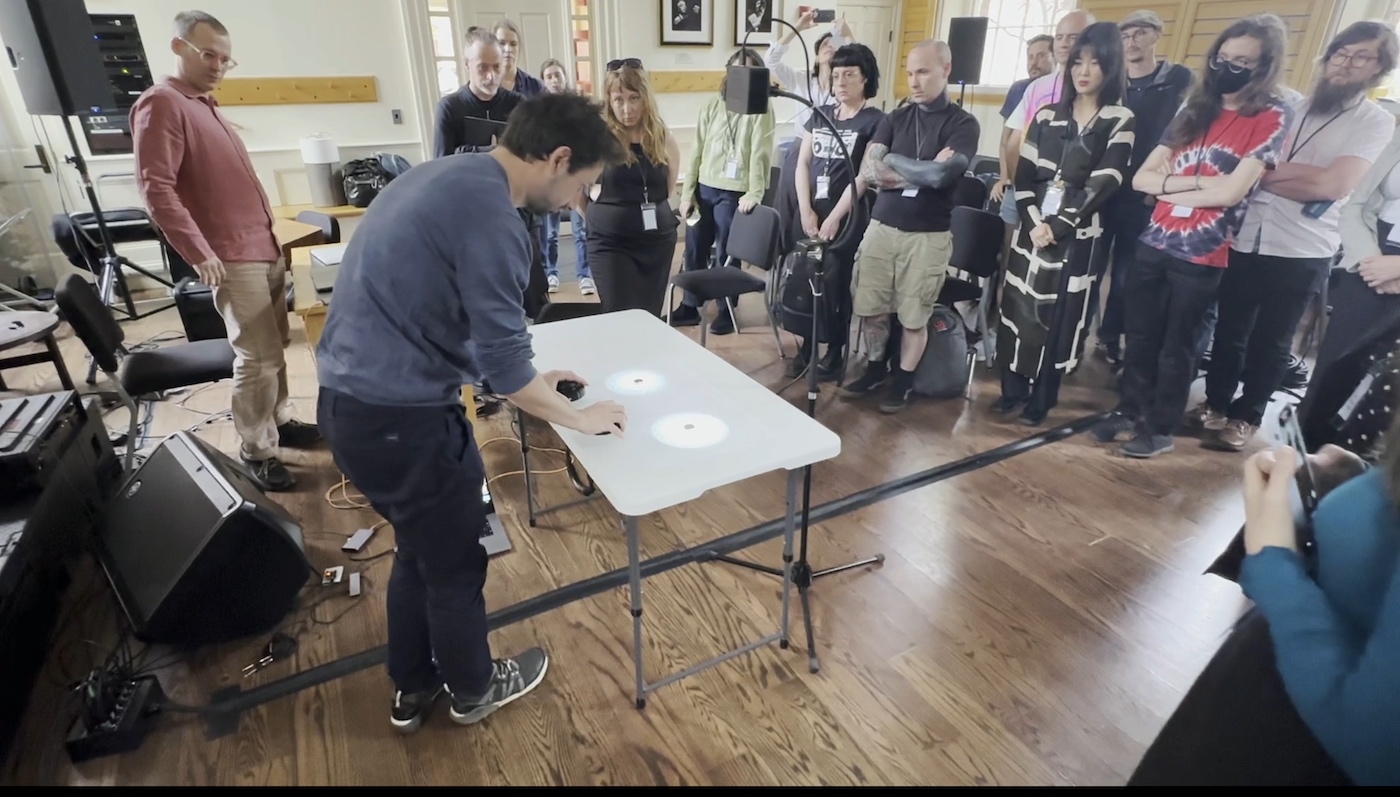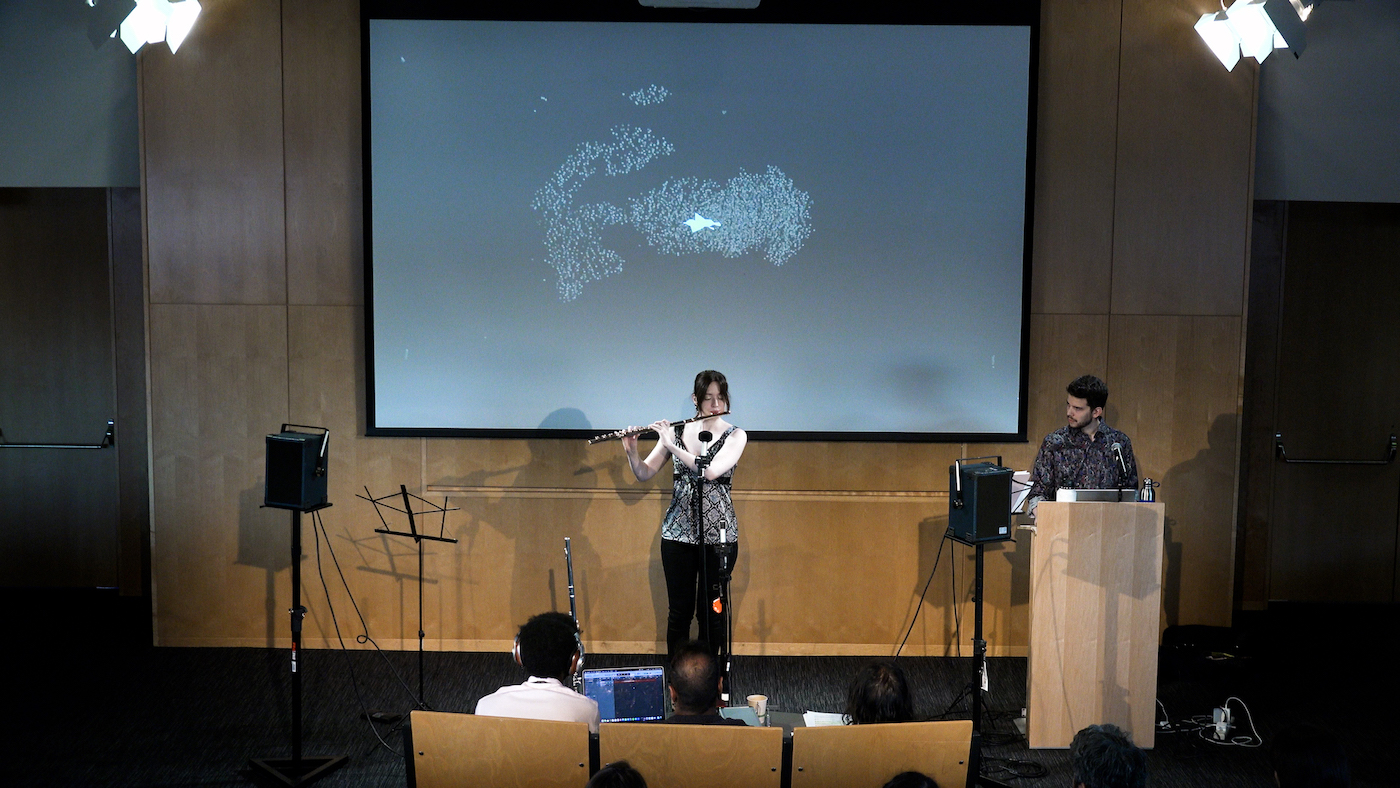Research Visit to Boston USA
Fri May 12 2023
Research Visit to Boston USA
Postdoc Jack Armitage and PhD student Nicola Privato are visiting Boston USA between May 10-17 to present research and concerts at Harvard University and Northeastern University.
If you will be attending either of these events, we look forward to meeting you, please do say hi!
Instruments, Interfaces, Infrastructures: An Interdisciplinary Conference on Musical Media
May 11-13, Harvard University Department of Music
https://sites.harvard.edu/instruments-interfaces-infrastructures/
Talk: “Agentology for Organology: Cyber-, Bio-, & Eco-Semiotic Perspectives on Instrumental Agency”
Jack Armitage
15:30, Holden Chapel
Magnusson in 2017 proposed a philosophy of organology based on heterarchical categorisation of musical instruments, hybridising older organologies with domain specific and ad-hoc micro-taxonomies, as needed. Instruments are now emerging whose design, behaviour and music is entangled with artificial intelligence, machine learning and data science. Correspondingly, a need is arising for new organological tools that decode, dissect and demystify these instruments. How can we begin to understand them and their musicological impact, and are these instruments in turn impacting sociotechnical discourse? Following Sharov and Tønnessen (2021), we propose agentology as an ad-hoc taxonomy for organological consideration of new agential and intelligent instruments, and also contemporary and historical instruments. Philosophers such as Latour and Barad, through to biologists like Maturana and Varela or Levin, to cognitive scientists like di Paolo or Froese, offer us a cornucopia of accounts of agency. Further, cyber-, bio, and ecosemiotics provide perspectives and tools that could be well suited for instruments which are starting to behave more like cells and animals than inert objects.
To put these theoretical perspectives to the test, I will draw on my own experiences as a practice-based researcher-designer-player of new instruments, and that of my research colleagues, testers and musical collaborators. I will describe our nascent methodology based on encounters between musicians and agential instruments, and how as researchers we are delicately probing at the technological, phenomenological and sociological edges of music. I will also present highlights of and grounded reflections on one and a half years of local community building around the inclusive exploration of intelligent musical instruments in Iceland.
Concert: “FerroNeural”
Nicola Privato and Jack Armitage
15:30, Holden Chapel
A performance combining Nicola Privato’s magnetic discs with Jack Armitage’s agential scores.

FerroNeural at Harvard
TENOR 2023
May 15-17, Northeastern University
https://tenorboston23.sites.northeastern.edu/
Paper & Demo: “The Magnetic Score: Somatosensory Inscriptions and Relational Design in The Instrument-Score”
Nicola Privato, Thor Magnusson and Einar Torfi Einarsson
Paper: Tuesday 16 May, 10:00, Paper Session 3, [NU; Ryder Hall, Rm. 161]
Demo: Tuesday 16 May, 15:30, [NEC; Pierce Hall; SB 118]
With the changes occurring in the dialectics between the composer and the interpreter during the second half of the twentieth century, the traditional concept of the musical score has undergone an ontological change. As composers began exploring unconventional notational practices and offering to the interpreter a higher autonomy in relating with the musical material, the locus of the musical information has become less defined, at times merging with that of the instrument. In this paper we explore the dual nature of notation both as score and as instrument from the point of view of non-visual methods of representation. We do this by presenting the Magnetic Score, a system for the inscription and generation of sound that relies on permanent magnetic fields. In magnetic scores, the relational design of the inscriptions and the interdependence of the symbolic and somatosensory layers offer original insights on the role and situatedness of the musical score in contemporary practices, as the performative gestures emerge out of the interpreter’s embodied interaction with the magnetic fields.
Paper & Demo: “Agential Scores: Exploring Emergent, Self-Organising and Entangled Music Notation”
Jack Armitage and Thor Magnusson
Paper: Tuesday 16 May, 10:40, Paper Session 3, [NU; Ryder Hall, Rm. 161]
Demo: Tuesday 16 May, 16:00, [NEC; Pierce Hall; SB 118]
Dynamic scores have become a popular intervention into musical performance, with novelty both for the performer and the audience. In this paper we describe agential scores and the implications of their emergent, self-organising and entanglement affordances for musical performance ecologies. We do so through practice-based research, introducing Tolvera, an ALife software library for agential scores. We offer a typology of interaction scenarios for agential scores, and explore a subset of these, presenting the outcomes of early artistic encounters with Tolvera between two improvising guitarists. Reflecting on our encounters, we highlight unique issues that arise out of engaging with scores as real-time agents, proposing that agential scores encourage fluidity of form in notation, which in turn provokes performers to identify with, mirror and attune to them. Though scores have always had agency, we find their rapidly increasing agency poses new questions, and new possibilities for the intra-actions between the human and non-human agents of musical ecologies.
Concert: “MOTHERBIRD”
Jessica Shand, Manuel Cherep and Jack Armitage
Tuesday 16 May, 20:00, New England Conservatory, Plimpton Shattuck Black Box Theatre, 255 St. Botolph St., Boston, MA 02115
Full details: https://tenorboston23.sites.northeastern.edu/performances/
MOTHERBIRD (2023) for augmented flute, electronics, and artificial life simulation reimagines the centuries-old flute-as-bird archetype in a 21st-century context in which anthropogenic climate change has drastically altered the soundscapes of the natural world. An early instantiation of Armitage’s Agential Scores, a mode of score creation which challenges entangling human performers and musical instruments with artificial life simulations, the piece positions the flute as one organism within an indeterminate global ecosystem—an ecosystem in which changing sonic textures mediate the flocking behaviors of birds, or Boids, in real time. Per the speculative writings of Anna Tsing, Donna Haraway, Karen Barad, and others, the performer-composers ask: how might storytelling and fictionality serve as tools for deconstructing anthropocentric regimes? In MOTHERBIRD, reality is front-and-center, urging listeners to engage critically in becoming-with non-human and more-than-human worlds.

MOTHERBIRD by Jessica Shand, Manuel Cherep and Jack Armitage